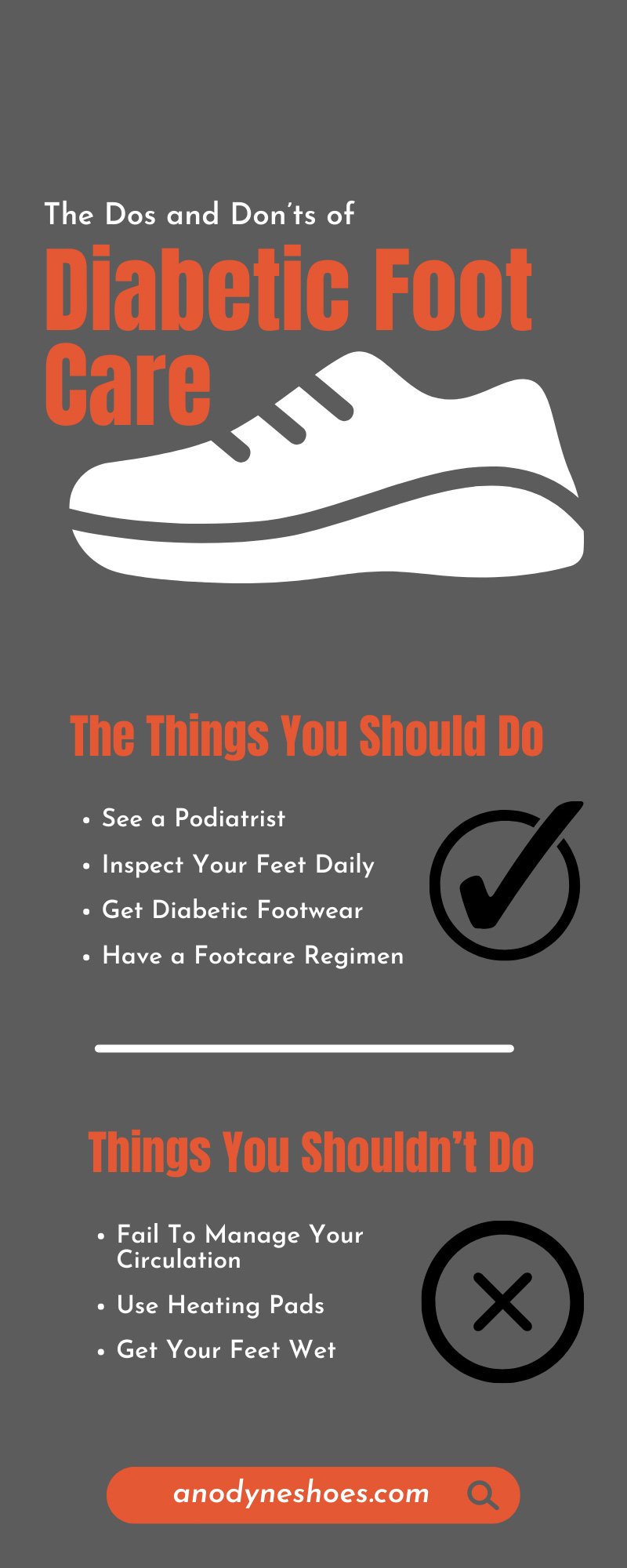%20(750%20x%20422%20px)%20(14).jpg?width=750&height=422&name=Anodyne%20Blog%20Template%20(1080%20x%201080%20px)%20(750%20x%20422%20px)%20(14).jpg)
Managing a condition like diabetes isn’t easy, but you can certainly get a handle on it. You just have to know the proper methods to take care of yourself, which, in the case of diabetes, extends to foot care. Below, we dive into the diabetic foot care tips, so you’ll know how to take care of your feet best. Read on to learn how to manage this aspect of your lifestyle.
The Things You Should Do
You should adopt certain habits if you want to perform adequate diabetic foot care. What are these habits? It depends on your needs, but some steps are critical no matter your situation. We’ll dive into everything—from seeing your foot doctor regularly to having a foot care regimen that will keep you on your toes.
See a Podiatrist
Make sure you see a podiatrist regularly. Podiatrists play a huge role in treating and detecting foot problems in people with diabetes. They can detect things like vasculopathy (blood vessel damage), neuropathy (nerve damage), and even arthropathy (joint damage), all of which you or general care doctors might miss.
There’s only so much you personally can do with your foot care. We’ll list a few practices below, but it’s important to realize that you only know so much. Take the burden off your shoulders by seeing someone knowledgeable of your situation who can detect and identify problems early and assist you in your diabetic foot care journey.
Inspect Your Feet Daily
Daily foot inspections are key to quality diabetic foot care. Try to inspect your feet twice a day, once in the morning and once in the evening. This is important because you’ll be able to catch any foot problems you might have early on.
For instance, if you deal with diabetic neuropathy and struggle with numbness in your feet, you might not be aware if your feet are cut or wounded in some other way. Combined with slower healing times for people with diabetes, the likelihood of longer and more serious infection increases. If left untreated, more drastic procedures such as amputation may become necessary. Prevent minor foot injuries from becoming serious issues by regularly inspecting your feet.
Get Diabetic Footwear
Diabetic footwear is essential for supporting foot health. Wearing diabetic shoes throughout the day and women’s and men’s therapeutic slippers at home is a great way to ensure your feet are safe. Remember when we mentioned that people with diabetes heal from wounds more slowly? Orthopedic footwear does wonders to protect your feet and prevent those wounds from occurring in the first place. Diabetic socks, for instance, are snug and fit your feet like a glove without feeling restrictive. They also promote circulation, which is necessary if you spend time sitting. We have some of the best diabetic shoes on the market at Anodyne, so check out our selection!
Have a Footcare Regimen
Having a foot care regimen in place if you have diabetes is critical. First, as we mentioned, you should inspect your feet twice daily. After that, wash your feet in warm water—not too hot or cold—ensuring you don’t soak your feet. After, apply lotion to the bottom and top of your feet—this includes the undersides, soles, and ankles. You can even get lotions specifically made for diabetic foot care. Finally, avoid going barefoot around the house after this process.
Also, you should have protocols in place if you notice any issues during your daily regimen. For instance, if you notice a corn or callous, call your podiatrist and do not attempt to remove the corn or callous yourself. This could lead to you cutting yourself and making your situation worse.
Lastly, make it a point to get regular circulation to your feet. This is best done through exercise and general leg and foot movement. For example, take the time you spend sitting to wiggle your toes or place a tennis ball underneath your feet and roll it over the soles.
Things You Shouldn’t Do
Just like there are habits you should implement, there are also habits you should avoid. Below, we’ll discuss things like circulation management and what happens when your feet get wet. Let’s review what can negatively affect your foot health.
Fail To Manage Your Circulation
Failing to manage your circulation can lead to some problems, including peripheral and conventional neuropathy. This means you need to be well aware of how to promote circulation to your feet. Many things help—especially exercise. You should also avoid smoking and drinking, as these habits contribute to poor circulation.
You’ll want to eat for heart health, which promotes quality circulation. This means you should fine-tune your diet to eat more fruits, veggies and whole grains. With a heart healthy diet, also known as the Mediterranean Diet, it’s important to watch your sodium intake. Too much sodium can cause your feet to swell, which isn’t conducive to foot health in people with diabetes.
Use Heating Pads
Using heating pads, electric blankets, and wraps may be tempting, especially if your feet are cold; however, we must urge you not to. If you have nerve damage, you won’t be able to tell how hot a heating pad is. If so, you won’t know when you’re burning your feet. Getting ahead on these things is important because, as we said, a wound or infected blister can become a serious concern. Burning your feet is the last thing you want to do as a person with diabetes. So avoid using heating pads and instead wrap your feet in a warm towel or blanket that won’t burn you or overheat your feet.
Get Your Feet Wet
If it’s a rainy or snowy day with slush on the ground, make sure you have shoes without holes or waterproof shoes that won’t leave your feet damp. You must use footwear that will keep your feet dry. This is because the extra moisture can lead to infection, especially in areas of the feet that experience high pressure in shoes, such as the soles and between the toes.
Now you have a solid understanding of the dos and don’ts of diabetic foot care. Following this advice will help you keep your feet safe and sound. We mentioned diabetic footwear earlier, and we just wanted to reiterate that Anodyne has an amazing selection of diabetic footwear that is both provides the support you require, the style you desire, and the comfort you need! . Browse our website or contact us today for more information!



.png?width=116&name=Anodyne_circle_1_logo%20(2).png)
